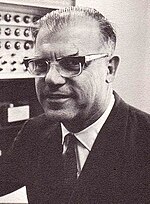Sidney Fox | |
|---|---|
 Sidney Walter Fox | |
| Born | 24 March 1912 Los Angeles, California, U.S |
| Died | 10 August 1998 (aged 86)[1] |
| Education | University of California, Los Angeles (BA); California Institute of Technology (Ph.D.) |
| Known for | Microspheres, studies of the origins of life |
| Scientific career | |
| Fields | Biochemistry |
| Institutions | Iowa State College, Florida State University, University of Miami, Southern Illinois University, University of South Alabama |
Sidney Walter Fox (24 March 1912 – 10 August 1998) was a Los Angeles-born biochemist responsible for discoveries on the origins of biological systems. Fox explored the synthesis of amino acids from inorganic molecules, the synthesis of proteinous amino acids and amino acid polymers called "proteinoids" from inorganic molecules and thermal energy, and created what he thought was the world's first protocell out of proteinoids and water. He called these globules "microspheres". Fox believed in the process of abiogenesis where life spontaneously organized itself from the colloquially known "primordial soup;" poolings of various simple organic molecules that existed during the time before life on Earth. He also suggested that his experiments possessed conditions that were similar to those of primordial Earth.
In his experiments, Fox demonstrated that it is possible to create protein-like structures from inorganic molecules and thermal energy. Fox went on to create microspheres that he said closely resembled bacterial cells and concluded that they could be similar to the earliest forms of life or protocells.
- ^ "Dead Scientist of the Week - Sidney W. Fox". deadscientistoftheweek.blogspot.com. March 25, 2013. Retrieved 7 September 2019.